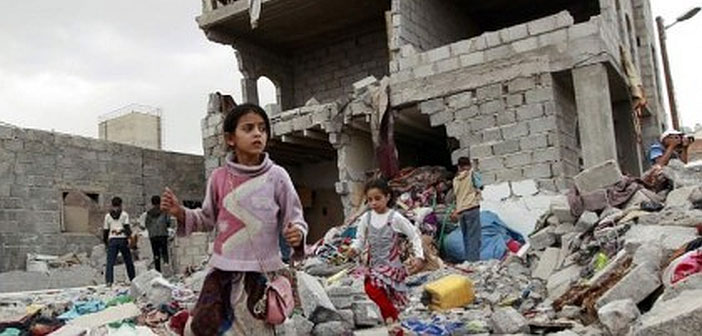Source: RT
News coverage of the suffering and carnage has been so sparse in the mainstream media you would struggle to locate it using the Hubble Space Telescope.
Britain’s unending boast that it stands as a beacon of human rights and justice is belied by the cruel plight inflicted on the people of Yemen.If a special place in hell is reserved for a Saudi kleptocracy that wears its barbarism as a badge of honor rather than shame, Britain’s ignoble role in actively facilitating Riyadh’s murderous war in Yemen is surely deserving of the same.
Thinking about it the scope of the inhuman brutality that has been inflicted on the Yemeni people over the course of a conflict that began in 2015, it is near impossible to fathom the pristine hypocrisy of a British political establishment that is never done lecturing the world on matters great and small.
Britain’s most revered prime minister, Winston Churchill, once famously described Russia as “a riddle wrapped in a mystery inside an enigma.”
Perhaps, perhaps not, but where there is absolutely no mystery or enigma is in a British foreign policy that is testament to opportunism rather than principle, one made worse by the sanctimony in which it comes wrapped, regardless of the ocean of blood of its countless victims year after year.
London’s opportunism and Riyadh’s sectarian brutality are currently entwined in a marriage of murder in Yemen, a conflict whose dismal human toll most recently accounted for 11 more people killed, children included, and 30 wounded in yet another Saudi airstrike unleashed on Sanaa, the country’s capital.
In a UN report on the conflict, published in November 2018, the military campaign conducted by the Saudis and their allies in Yemen has accounted for 17,640 civilian casualties since it began in 2015, including 6,872 dead and 10,768 injured, excluding those who have perished from malnutrition and disease. However, in a piece for the UK’s Independent news website in October 2018, veteran and respected Middle East correspondent, Patrick Cockburn, made the astonishing claim that the official casualty figures in Yemen have been vastly understated.
“Little information about casualties in Yemen reaches the outside world because Saudi and the UAE make access difficult for foreign journalists and other impartial witnesses. By contrast to the war in Syria, the American, British and French governments have no interest in highlighting the devastation caused in Yemen – they give diplomatic cover to the Saudi intervention.”
Patrick Cockburn makes a cogent point when it comes to the assertion that Britain and its Western allies have “no interest in highlighting” the devastation that has and continues to be wrought in Yemen by the Saudis. News coverage and analyses of the suffering and carnage has been so sparse in the mainstream media you would struggle to locate it using the Hubble Space Telescope.
Riyadh is the single biggest customer of the UK arms industry, within which the country’s principal arms manufacturer, BAE Systems, has been the trade’s principal beneficiary – this to the point where the Saudi national flag should be flying over the company’s corporate headquarters in central London, alongside a bright red flag denoting the blood that is on its corporate hands.
For those who may accuse me of lapsing into hyperbole at this point, consider that with the legal sanction of the British government, the Saudis purchased a sixth of everything BAE Systems produced in 2017, and that, according to the UK pressure group, Campaign Against Arms Trade (CAAT), many of those weapons have been used by the Saudis in Yemen against civilians, thus in violation of international humanitarian law.
It’s also worth pointing out that in 2016 the European Parliament voted for an EU-wide arms embargo on Saudi Arabia, which the UK government blithely ignored; more interested in the cash bonanza to be had with the sharp uptick in arms sales to the kingdom due to the war in Yemen.
But it’s not only on the level of arms sales that Britain is up to its bowler hat in blood when it comes to Saudi war crimes. British technical expertise and military assistance have also been brought to bear in the conflict in Yemen – and far more extensively than previously thought. We know this because the role of UK defense contractors in this regard, many of them BAE Systems’ employees, others ex-UK military personnel working under direct contract to the Saudi government, was recently the subject of a Channel 4 Dispatches documentary.
Among the most damning of the evidence revealed in the documentary is that the Saudi air force would be unable to fly the British Typhoon fighter jets used to conduct airstrikes in Yemen without the technical assistance of UK personnel, working at airbases within the kingdom.
We already knew, due to an expose that appeared on the Mail Online news website in November 2017, that British military personnel had been revealed to be engaged in training Saudi troops for the war in Yemen in a mission known as Operation Crossways. Now, with the damning evidence revealed by Dispatches, there is no arguing the fact that the war in Yemen is as much a British war as it is Saudi.
I mentioned the UK pressure group, CAAT, earlier. As these words were being written, CAAT – with the backing of Human Rights Watch, Amnesty and Oxfam – were preparing to enter the Royal Courts of Justice in London to appeal against a 2017 High Court ruling, denying a judicial review of UK arms exports to the Saudis.
In the society to which I aspire, CAAT would be entering the court to give evidence at the trial of the CEO of BAE Systems, Mr Charles Woodburn, on a charge of accessory to war crimes. Justice in a country whose ruling class is not afflicted by a profound moral sickness would surely dictate nothing less.
Such a country is not Britain in 2019.

